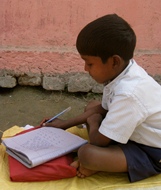The largest ever exercise to detect deficiency, disease and disability among school children in India will soon be undertaken, covering 220 million children.
The initial health screening of the programmecarried out by the Union health ministrywill target children aged six-18 years in 1,100,000 government-runschools across a total of15 states.
Union Health Minister Ghulam Nabi Azadspoke on howthe programmes, "will protect and promote the health of human capital from the beginning. It is universally known that healthy students are more receptive to education, which naturally, influences their scholastic attainment. Around 15 states have positioned dedicated teams for SHP."

The School Health Programmes (SHP) will undertake biannual health service provision through screening, healthcare and referral to look for anaemia and assess the
nutritional status of children,in addition totesting their visual acuity and hearing skills.
Dental check-up, common skin diseases, heart defects, physical disabilities, learning disorders and behavioural problems will also be amongthe programmes' priority.
The Union has recently set aside the necessary funds for 2012-13 and2,414 dedicated teams will be put in place at block levels to conduct theinitiative under theremit of the flagship of the
National Rural Health Mission.
Basic medicine kits to take care of common ailments prevalent among young school-going children and referral for service connectivity from primary till super-specialist health facilities will be undertaken.
Nabi Azadadded, "We want to conduct universal screening of population. Early detection is of prime importance in case of disability or disease." The ministry expects the programme to take off from January across all the 15 states.
Within the government-aided schools supportive infrastructure will be put in place.Health clubs and health cabinets will be introduced. First aid rooms, corners and clinics with support from educational departments and trained staff will be established.Lastly, physical education and activities will be popularized.
Read the original article, from
The Times of India.

